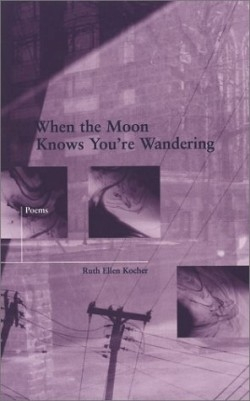When the Moon Knows You're Wandering
The imagery of these poems
revels in color (“this month/
will always have a man in red pants / and a new blue shirt“), in emotional intensity (“his head hung so low / shoulder blades become wings / threatening to burst through his back”), and, in poem after poem, an intimacy with natural history (” we walked a mile to bury this blue fish [which] now… with its small brain / dead soft with parasites and wearing / death’s humble gray would feed the earth again.”
The author’s subject matter is refreshingly varied, the emotional tone drifting from languid, through building, to outrage. Her use of enjambment functions like a brickbat, designed not merely to invite but to stun the reader on to the next line: “She has the terrible love of the praying / mantis, this girl…”
More fun than almost anything else is the way this intrepid poet, dealing with the giddy shenanigans of nature, gaily thumbs her nose at pathetic fallacy: “I can tell you that the grass sorrows / if there is no thunder or the earth shudders / where people sleep or the mountains mouth / their wishes silently into snow.”
It’s a slim collection, divided into three sections. Throughout the twelve poems in the first section, “Lost and Leaving,” the majority of both situations and dramatis personae seem “made up.” However, they are made up of an evocative combination of imagination and the memory remnants of a lifetime of keen observation. One poem, “The Escape Artist,” is a tour de force of extended metaphor that ends: “You are waiting for the miracle? / You are waiting for the slim / left hand, for the right hand, fingers / that find their own way out of cool / confinement. You are free.”
The middle section, “Home,” moves from the dramatic to the community, beginning with “At Home the People Sing,” a signal poem combining a tender affection for the folkways of the poet’s native community and a chilling recognition of the persistence of bondage: “a small country… the sun / hard enough / to hurt them, their black / black skin composing a thirst for songs / to build a grief / that will stun the snakes, pucker / the beans, remember the exact width / of hallways before the first creaking board.”
The final section, “Wars Away,” is pure lament, a catalogue of the infinite ways in which the peril of living in a body is compensated by a compassion felt and given, a hard-earned celebration of the specificity of being human. It’s a fitting finale for twenty-eight poems that sing in a voice wavering through grief to triumph in the clear syllables of love.
Disclosure: This article is not an endorsement, but a review. The publisher of this book provided free copies of the book to have their book reviewed by a professional reviewer. No fee was paid by the publisher for this review. Foreword Reviews only recommends books that we love. Foreword Magazine, Inc. is disclosing this in accordance with the Federal Trade Commission’s 16 CFR, Part 255.

